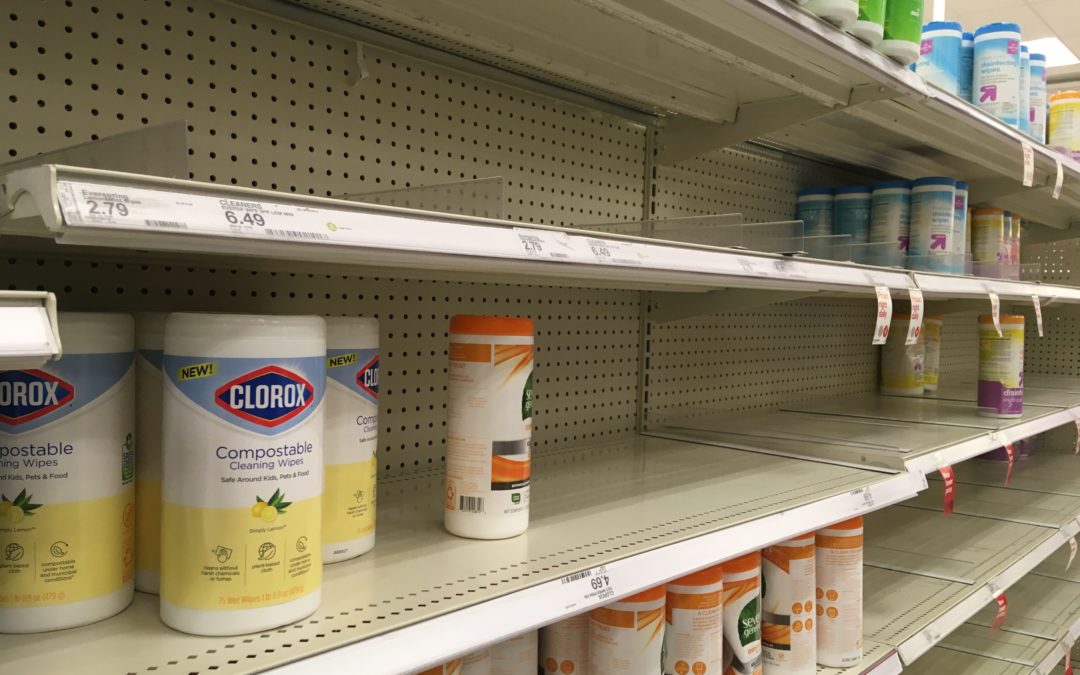In times of crisis, people show their true colors.
At the outset of my state’s coronavirus shutdown, I headed to my local Target to do what most Americans did–stock up on supplies. In the household cleaning aisles, I got a focus group worth of information about how we view green brands and why mass adoption continues to be slow.
The Word ‘Clean’ Doesn’t Necessarily Mean ‘Green.’
During this pandemic, ‘It kills 99.99% of germs and bacteria’ has become the new definition of clean.
Clorox and Lysol are having a record-breaking year. Why? Because no one cares that their disinfecting wipes are chlorine laden and end up in landfills. Do you really believe if consumers knew between 1%-2% of the world’s electricity goes to making chlorine that they would change their buying behavior? Meanwhile, the compostable wipes are the only items left on the shelves.
Clean and healthy are no longer adjectives to describe sustainable living. They’ve become adjectives to describe staying alive.
We should be celebrating that cleaner air has allowed Indians to see the Himalayas for the first time in decades and that Angelenos can enjoy the sight of the San Gabriel Mountains. Unfortunately, the irony is COVID-19 has made us less able to see the horizon.
As we’ve retreated into our personal cocoons, clean and healthy for the future of the planet has taken a hit across a wide variety of sectors to the ascendent view of a narrowed focus of short term behaviors to benefit those in the immediate concentric social circle.
Is Sustainability Possible In This Pandemic Era?
I’m not just wagging my finger at others. I’m guilty too. I haven’t owned a car in five years, and my life’s circumstances have allowed me to rely on my transit pass and car share. But this past weekend, I bought a car.
When I calculated the limited number of people who would be allowed on a single bus or train for the foreseeable future, it became clear I needed more reliable transportation. I’m rationalizing my choice because I bought a used Nissan Leaf. Still, the reality is I didn’t want to risk the exposure to others I don’t know, as well as the potential loss of productivity due to unreliable mass transportation.

No matter that I purchased an EV, my carbon footprint just went up. Transportation already causes 40% of global carbon emissions in the U.S., but there’s no way around this: mass transit is going to take a mass hit in the short-to-midterm. And this is before factoring in historically cheap gasoline and desperate car dealer incentives for millions of gas-powered cars and SUVs they need to sell.
Speaking of which, if you watch or stream TV, you haven’t seen a single mention from any car company about gas mileage since the pandemic began. Do you know what you do hear, though? Soft, consoling words about safety and reliability.
You can see this trend across the consumer landscape. The sustainability of your life depends on how safe your life is.
Food Is Another Sustainability Brand Bellweather
One sign of hope for long-term thinking during this crisis is the demand for organic produce and eggs. While many conventional farms are destroying crops and livestock, organic producers are having a hard time keeping up with orders.
I’d argue the reason for the uptick is that the desire for ‘clean and healthy’ food more closely mirrors the emotional drivers for other ‘safe’ consumer products that are seeing growth.
To that end, it’s no surprise purchases of packaged foods are also up.
No doubt, the packaged provisions plumed off grocery shelves is partly due to people eating more at home. Convenience is a cultural totem of the American psyche.
Looking deeper, however, packaged foods have long benefitted from consumers’ association that something wrapped in plastic is free from contaminants and the elements. Hell, even Kellogg’s cereals, fruit snacks, and packaged ice cream are seeing sales increases over last year.
So yes, once again, the meaning of clean isn’t necessarily healthy, but rather safe for your family to eat.
How Can Green Brands Survive?
A fatal mistake any green brand can make right now is to appear more interested in the planet than in the people who are living on it and living through this nightmare.
To survive and thrive through the COVID menace, green brands need to make sustainability safe, but that doesn’t mean you have to throw out your entire marketing campaign.
‘Clean’ and ‘healthy’ are two words with which every green brand should be familiar. By making people the end beneficiary of that philosophy rather than the planet, they can keep their core values while extending their brands to new audiences whose only goal right now is survival–medically and financially.

